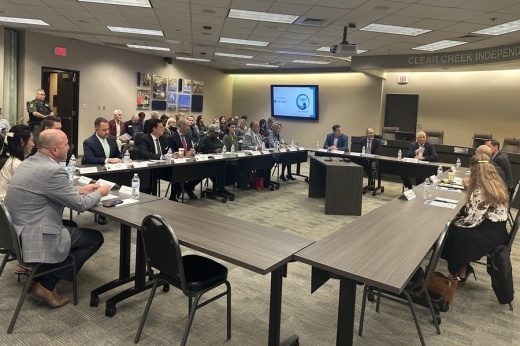With four main priorities presented revolving around school safety, salaries, special education and property insurance for storms, legislators were hesitant about meeting some of the school districts’ needs.
The overview
The following school districts were in attendance and listed legislative priorities to state Sen. Mayes Middleton, R-Galveston, state Rep. Greg Bonnen, R-Friendswood, and state Rep. Terri Leo-Wilson, R-Galveston:
- Clear Creek ISD
- Dickinson ISD
- Friendswood ISD
- Galveston ISD
- Sante Fe ISD
- Texas City ISD
Diving in deeper
For school safety, officials from all districts present stated they want to see the following priorities for the upcoming legislative session:
- Enhance safety measures in schools to protect students, staff and the community by increasing the school safety allotment
- Revise Chapter 37 of the state code, which allows teachers to remove disruptive students from their classrooms, so schools can appropriately address disruptive student behavior. These revisions should include removing the three day in-school suspension limitation, out-of-school suspension restrictions for certain students, and the admission, review and dismissal, or ARD, committee requirements for disciplining a student with a disability in any manner for bullying, harassment or making a hit list.
- Consider grant funding for innovative programming and practices for behavioral placements to ensure appropriate support and intervention
“We all recognize that a school shooting can unfortunately happen anywhere at any time,” Bott said at the forum. “That was three and a half years ago when I moved to Santa Fe, so the superintendents that I've talked to since then, have gone from ... ‘I hope you're okay,’ [to] ‘What are you doing now? What infrastructure do you have in place? What safety and security protocols do you have in place?’”
For salaries, officials from all districts present stated they want the following priorities for the upcoming legislative session:
- Improve teacher retention, attract high-quality educators and improve overall student outcomes by increasing the salaries of teachers, counselors, librarians, nurses, custodians, bus drivers and all other district staff
- Contribute more state funds to the Teacher Retirement System of Texas, or TRS, ActiveCare health plan to reduce the inflationary impact on educators and staff
“Teachers, educators, people on our campuses in our districts carry all of that weight on their shoulders while trying to provide that high quality education for our students.”
What else?
For special education, officials said they want to ensure all students with disabilities receive a quality education. They said this can be done by investing additional weighted funding for special education students that offsets the rising costs of providing services and resources for training and retraining special education teachers.
“We're anticipating a little over a $9 million deficit in what we'll actually spend this year versus what we'll receive from state and federal counties [for special education],” CCISD Superintendent Karen Engle said at the forum. “So just looking to close that gap, and the way we're asking to look at that is transitioning to a service intensity-based funding system so that the students, the services they receive, get funding for that.”
Lastly, officials said they want legislators to consider lowering property and casualty insurance expenses for storm-prone areas of Texas by establishing an allotment for school districts affected by high windstorm insurance premiums.
“Districts along the coastline ... we have some costs that other districts simply don’t have,” GISD Superintendent Matthew Neighbors said at the meeting. “There are districts that don’t have to have ... flood insurance [and] wind insurance. Our ask on this one would be just like you have allotted for other ... special circumstances, that there should be consideration for districts that have certain costs that they simply can't avoid and that are not standard across the state, such as insurance and storm coverage.”
What they said
Wilson said she felt a lot of funding school districts could’ve had was lost when the school voucher program didn’t pass at the 2023 legislative session.
“I’m just being honest ... I think that you had some associations that didn’t do justice in turning down a huge lot of money on safety, $4,000 per teacher, $2,000 per paraprofessional,” Wilson said at the forum. “We put in safeguards, we put in inflationary pay, and it was likely not enough. When I think about this as a teacher, that was scholarship money that took nothing away from public [education] dollars.”
Legislators at the forum said allotting funds to a number of different areas may be difficult for this upcoming legislative session.
“Everybody wants the basic allotment to go up, but then you want funding for all these other items, so how do we do that?” Bonnen said. “What the legislature will do is say ... ‘You can have some discretion, but we want to put more money into special education. We want to put more money into school safety,’ and so you are going to have money that is designated for those purposes, but then, by definition, that is not going into the basic allotment. You're still getting it, but you're not getting it through that avenue of employment.”





